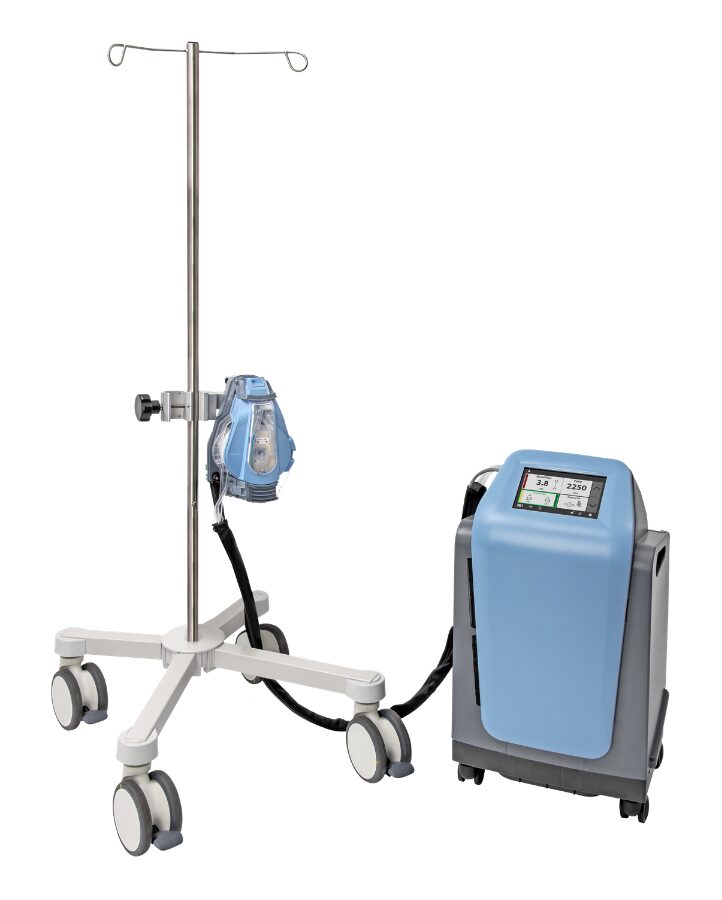December 23, 2020
Abiomed reports the first two patients in the world have been treated with the Abiomed Breethe OXY-1 System, a compact cardiopulmonary bypass system.
The advanced ECMO technology pumps, oxygenates, and removes carbon dioxide from blood for patients whose lungs can no longer provide sufficient end organ oxygenation.
The system can help provide oxygenation to patients suffering from cardiogenic shock or respiratory failure from ARDS, H1N1, SARS, or COVID-19. When used with the Impella heart pump, it can unload the heart and oxygenate the body, a combination therapy known as ECpella.
The first patient is a 21-year-old woman at the University of Maryland Medical Center who sustained a lung injury and was placed on V-V ECMO with the Breethe system. She immediately began to improve and was able to ambulate daily.
In this video, see the first patient to be treated with the Abiomed Breethe OXY-1 System™ walking while on support. pic.twitter.com/GC6kgcwBWK
— Abiomed (@abiomedimpella) December 21, 2020
After eight days, the patient was successfully weaned off Breethe support and is no longer in the ICU. The patient was treated by Bartley Griffith, MD, the Hales Distinguished Professor of Surgery at University of Maryland, School of Medicine and Daniel Herr, MD, chief surgical critical care services and medical director cardiac surgery ICU at University of Maryland Medical Center.
The second patient is a 51-year-old woman being treated at HUMC/Hackensack Meridian Health for respiratory failure due to COVID-19. After 24 hours of V-V ECMO support with the Breethe system, she is stable and improving. The patient was treated by Mark Anderson, MD, chief of the division of cardiac surgery and cardiothoracic surgeon at the Heart and Vascular Hospital at HUMC/Hackensack Meridian Health.
“Breethe is an important new option for patients with COVID-19 who require ECMO therapy. It is simple and intuitive to use, highly portable and a very promising therapy with the potential to help many patients,” said Dr. Anderson.
“This revolutionary technology will change the way we think about extracorporeal life support therapy by enabling physicians to easily mobilize their patients in turn promoting a faster recovery,” said Dr. Griffith. “I am pleased to be a part of this milestone as Abiomed continues to advance respiratory and cardiac support to improve patient outcomes.”
“The Breethe system significantly facilitates early mobilization and physical rehabilitation, which is critically important in the recovery of our patients,” said Chris L. Wells, PhD, PT, CCS, ATC, associate professor at the University of Maryland, School of Medicine, EBP, and research coordinator in the department of rehab services at University of Maryland Medical Center. She is also member of the medical team who treated the first patient.
Breethe adds to Abiomed’s innovative portfolio focused on native heart and lung recovery. Abiomed now provides the treatment options of the catheter-based Impella heart pump, which unloads the left ventricle, perfuses end organs and allows the heart to rest and recover, Breethe, which provides oxygenation, and the combination therapy of ECpella, when Impella and Breethe work together to unload the heart and oxygenate the body.
The Breethe system received FDA 510(k) clearance in October. It is being rolled out through a controlled launch at select hospitals in the United States, with full U.S. commercial availability expected in calendar year 2021.
